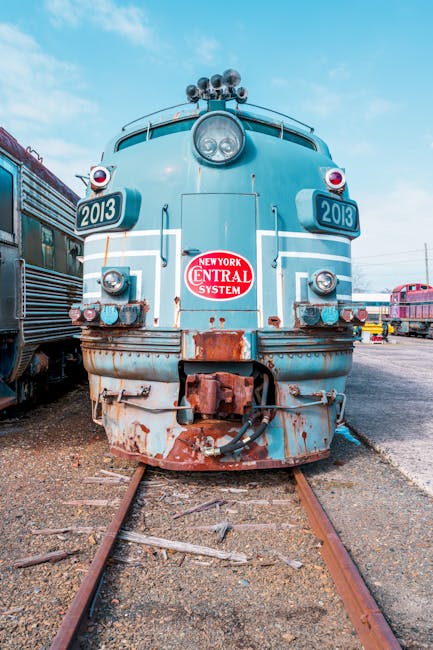New Jersey Train Strike: Impact, Causes, and What the Future Holds
The New Jersey Train Strike: A Deep Dive into the Disruption
The recent train strike in New Jersey sent shockwaves through the state, disrupting the daily commutes of thousands and highlighting the complex issues within the transportation sector. This in-depth analysis delves into the causes of the strike, its significant impact on commuters, businesses, and the economy, and explores potential solutions and the future outlook for New Jersey’s rail system.
The Genesis of the Dispute: Understanding the Underlying Causes
The New Jersey train strike wasn’t a spontaneous event; it was the culmination of long-standing disputes between the involved parties – primarily the unions representing rail workers and the management of the New Jersey Transit (NJT) or its contracted operators. Several key factors fueled the tensions leading to the walkout. These include:

- Wage stagnation and benefits cuts: Union representatives argued that wages hadn’t kept pace with the rising cost of living, and proposed benefit cuts threatened the financial security of workers and their families. This is a common thread in many labor disputes across various sectors.
- Working conditions: Concerns about safety, excessive workloads, and inadequate staffing levels contributed to the growing discontent among rail workers. The stressful nature of the job, coupled with pressure to maintain schedules, exacerbated these issues.
- Pension and retirement security: The future of pension plans and retirement benefits played a significant role in the negotiations. Workers worried about the long-term financial stability of these crucial components of their compensation package.
- Lack of communication and trust: A breakdown in communication and a perceived lack of good-faith negotiation between union leadership and NJT management further intensified the conflict. The absence of trust fostered an environment of distrust and antagonism, making compromise difficult to achieve.
- Contractual disputes: Specific disagreements over contract terms, including work rules, overtime pay, and disciplinary procedures, were also major sticking points in the negotiations. These intricate details often become significant barriers to resolving labor disputes.
The Ripple Effect: Assessing the Impact of the Strike
The New Jersey train strike had far-reaching consequences, affecting various aspects of life in the state. The most immediate and noticeable impact was felt by commuters, who faced significant disruptions to their daily routines.

- Commuters’ hardship: Thousands of commuters were left stranded, forced to seek alternative transportation methods, often facing overcrowded buses, long delays, and increased travel times. This caused significant inconvenience and financial strain for many.
- Business disruptions: Businesses, particularly those reliant on a daily influx of commuters and employees, suffered significant losses due to reduced productivity, missed appointments, and decreased sales. The ripple effect extended to other sectors of the economy.
- Economic repercussions: The strike had a noticeable impact on the state’s economy, affecting various industries such as hospitality, retail, and tourism. Lost productivity and decreased consumer spending contributed to the overall economic downturn.
- Social implications: The strike heightened social tensions and highlighted the inequalities within the transportation sector. It also spurred debates about the rights of workers and the importance of fair labor practices.
- Political fallout: The strike became a significant political issue, attracting attention from state and federal lawmakers who attempted to mediate the dispute and find a resolution. The political implications are often long-lasting.
Finding Common Ground: Exploring Potential Solutions and Future Outlook
Resolving labor disputes requires a multifaceted approach that addresses the core issues driving the conflict. Several strategies could be explored to prevent future strikes and improve labor relations in the New Jersey transit system:
- Improved communication and negotiation: Establishing open and transparent communication channels between union representatives and NJT management is essential. Good-faith negotiation and a willingness to compromise are crucial for reaching mutually agreeable solutions.
- Independent mediation and arbitration: Engaging an independent mediator or arbitrator can help facilitate negotiations and provide neutral guidance in resolving complex disputes. Arbitration can be a crucial tool in avoiding protracted strikes.
- Addressing wage and benefit issues: Implementing fair and competitive wage increases and protecting existing benefits can help address workers’ concerns about financial security. This demonstrates a commitment to fair compensation.
- Improving working conditions: Investing in improved safety measures, reducing excessive workloads, and providing adequate staffing levels can significantly enhance working conditions and improve morale among rail workers.
- Long-term planning and investment: NJT needs to invest in long-term planning for infrastructure improvements, fleet upgrades, and technological advancements. Modernization can enhance efficiency and worker satisfaction.
- Strengthening labor laws and protections: Reviewing and strengthening labor laws to ensure fair labor practices and protect the rights of workers can foster a more equitable and stable transportation sector. Stronger worker protections can deter disputes.
Lessons Learned and Future Implications
The New Jersey train strike serves as a stark reminder of the importance of addressing labor disputes promptly and effectively. It highlights the need for open communication, fair labor practices, and proactive investment in the transportation sector. The experience will hopefully lead to reforms in negotiation processes and better protection for workers’ rights. The long-term implications will influence future labor negotiations within the transit system and potentially other sectors. Improved relations and a commitment to fairness are essential for preventing future disruptions and ensuring a reliable and efficient transportation system for New Jersey residents.
The Role of Government Intervention
Government intervention can play a crucial role in resolving labor disputes, especially those affecting essential services like public transportation. Governments can act as mediators, facilitating negotiations and offering potential compromise solutions. They can also provide financial incentives to encourage agreements or implement legislation to protect workers’ rights and prevent unfair labor practices. The level and type of intervention depend on the specific context of the dispute and the political climate.
The Impact on Public Opinion
The New Jersey train strike significantly impacted public opinion, with opinions divided along various lines. Commuters generally expressed frustration and anger at the inconvenience and economic disruption caused by the strike. Sympathy for the striking workers was also widespread, given the often-difficult working conditions and perceived lack of fair treatment. Public opinion often influences the outcome of such disputes, putting pressure on both management and unions to reach a resolution.
Looking Ahead: Preventing Future Strikes
Preventing future train strikes in New Jersey necessitates a collaborative effort between NJT management, labor unions, and government agencies. This includes proactive engagement in labor relations, fostering open communication, and prioritizing worker welfare. Regular review of contracts, addressing concerns before they escalate into major disputes, and investing in improvements to the transportation system will be key to a more stable and reliable service for commuters.








